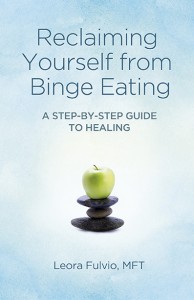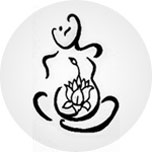 Joanna Poppink, Los Angeles based Eating Disorder Therapist and author of Healing Your Hungry Heart wrote a wonderful review of my new book that I’d like to share:
Joanna Poppink, Los Angeles based Eating Disorder Therapist and author of Healing Your Hungry Heart wrote a wonderful review of my new book that I’d like to share:
Leora Fulvio takes the mystery out of binge eating in her wonderful new book, Reclaiming Yourself From Binge Eating: A Step-by-Step Guide to Healing and offers practical and caring information about how to end this destructive way of living.
Kind and thoroughly practical, Reclaiming Yourself from Binge Eating is readable, engaging and eye opening. Fulvio obviously cares about people who binge eat and covers the territory so well that anyone who binge eats will find her way of eating, thinking and feeling somewhere in these amazingly helpful pages.
For starters, Fulvio gives one of the best descriptions of resistance to positive change I’ve read in a long time. Keeping with her style of describing a problem and then offering clear solutions, she describes common sense ways of moving through resistance. Her information, style and tone is steady and confident as she describes the many facets of binge eating and how to cope with them in a positive and healing way. Readers are certain to feel her confidence and grow more confident themselves as they follow her exercises and guides to self discovery on the way to freedom from binge eating. She is wise and reassuring when she writes, “Sometimes, just allowing yourself to have autonomy and to have authority over your own decisions can be so liberating.”
Throughout this friendly and honest book Fulvio offers clear cut and practical methods to address binge eating episodes and vulnerabilities that can often elude the thinking of a person who binge eats. She does this with a series of question and answer situations that help an individual find her own answers, answers that empower her in ways that she needs to gain her freedom.
Reclaiming Yourself from Binge Eating shows you how:
- healing from excessive shame is vital to binge eating recovery;
- ongoing wars within the binge eater’s psyche play out in ways of eating;
- binge eating is a filter that blocks healthy and honest messages from body to mind.
Learning this allows the reader to embrace the healing steps Fulvio defines clearly, directly and with compassion. She shows the reader that removing the eating disorder filter is crucial for recovery.
Moreover, she gives an excellent description of how to define healthy eating in a way that makes it approachable and manageable. She is kind and reasonable when exploring healthy size and shape, introducing the reader to self respect and showing her that she can free herself of stereotypes and be the woman she is.
I especially enjoy the questions Fulvio offers to deal with questionable behavior. For example, a person with a tendency to people please may not know she is sacrificing her needs for someone else. The questions: “Will I feel resentful if I say, ‘yes’?” “Will I feel guilty if I say, ‘no’?” are a clear and concise way of recognizing motives. Again Fulvio shows the reader that she has a choice.
Her description of many different styles of binge eating helps the reader find and recognize herself and her behaviors. Again and continually, Fulvio shows you a problem and how to resolve it. I appreciate her style of being comprehensive in looking at binge eating behavior and always offering ways to understand and resolve troublesome feelings and actions. This approach will help readers feel appreciated and understood. This is key because when a person feels genuinely understood she is more likely to accept and explore the healing path that is presented. This is true in face to face psychotherapy as well, and Fulvio understands this need.
Her first exercise, finding your inner core and wise voice by being still with your hand over your heart, is simple, non threatening and lovely. It’s a way to begin to love and respect your body, move into a mindfulness state, recognize body messages and discover emotions all at the same time. Fulvio shows caring wisdom in presenting this exercise to the reader first.
Some highlights I especially like:
- Developing the habit of creating challenge statements and responding is an excellent way to interrupt the eating disorder filter. Writing both the challenge and the response when a binge urge looms is an intervention I will introduce in my practice.
- The description and detailed explanation of how diets fail a person who wants to lose weight, how they trigger binges, how they contribute to weight gain and how difficult it is for people to understand this is engaging, helpful, personal and vital for a binge eater to understand.
- Bringing clarity to the false promises of diets is a valuable part of this book. It is one of the precious gifts the author gives to the community of people who want to lose weight yet follow quick weight loss diets and programs that only result, after initial weight loss, in weight gain. She clearly confronts the fantasy that diets help a person lose weight. She directly addresses the false beliefs and self criticism that are often in the mind of a woman who has lost weight in the past by following diets.
Describing various kinds of triggers: emotional, physical, geographical and going into detail about bewildering triggers such as feeling too full and bingeing on top of a full stomach will help the reader find herself in the pages and encourage her to work the alternative action log Fulvio offers. Her chapter on food where she describes what food is, what foods are needed for a healthy life, how to know what to eat and how to choose what you need without triggering a binge is sure to be a gift to many who have been lost in binges and need a gentle, informed and non triggering education in how to effectively nourish themselves. She then shows you how to begin eating three meals a day – a particular challenge for people who eat throughout the day or for people who skip meals only to binge out of sustained deprivation. This section is a challenge, but her gentleness and practical attitude allows the reader freedom to choose, stumble, regain her footing and discover what works best for her. She offers many useful and engaging exercises to build strength and awareness, particularly mindfulness exercises that help a person make healthy intuitive choices.
I was particularly interested in her approach to dealing with Night Eating Disorder. I think many people with NES will find help and hope from what she says.
Her chapter on relapse is honest, practical and reassuring. She offers a list of probing questions to ask during or after a relapse incident that, I believe, will help a person regain her footing, avoid dangerous self-incrimination and be stronger for the experience.
Reclaiming Yourself from Binge Eating is a gift to people who binge eat, want to stop and don’t know how. Fulvio knows how to stop and to heal and how to reclaim personhood through health and freedom. I highly recommend this book.
Joanna Poppink, MFT
Los Angeles psychotherapist
author of: Healing Your Hungry Heart: recovering from your eating disorder
http://www.eatingdisorderrecovery.com
Online Binge Eating Treatment - LEARN MORE!
EVIDENCE BASED INTERVENTIONS THAT REWIRE YOUR BRAIN TO:
-
STOP BINGE EATING
-
AUTOMATICALLY MAKE HEALTHY CHOICES
-
GAIN A FEELING OF PEACE AND CALMNESS IN YOUR BODY
-
RECOVER FROM BINGE EATING FOR GOOD



 Follow
Follow
